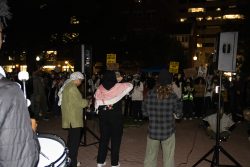“Our overwhelming strength may be a cause for resentment, but it may also be a reason for other countries to want to be with us rather than against us,” said Marjorie Ransom, moderator and project director of the panel series entitled “Talking with the Islamic World: Is the Message Getting Through?” On Tuesday, panelists discussed U.S. image and perception in the Islamic world after Sept. 11 and more recently in regards to the Middle East conflict.
According to Rami G. Khouri, a Jordan-based syndicated political columnist, the United States has had very few successes and many failures in foreign policy and public diplomacy in the Middle East. Khouri said that the United States should drop its overly simplistic models when analyzing the Middle East.
“This one-dimensional characterization of foreign cultures and religions is incredibly simplistic and counterproductive,” Khouri said.
Khouri added that many people in the Islamic world do not criticize American values in theory, but do object to the decrease in quality of life that result from the implementation of American policies. In order to be successful in their foreign policy in the Middle East, the United States must “practice what they preach,” Khouri said.
“This terrible contradiction is getting worse and worse, and I think this is where our focus needs to be,” Khouri said.
Several of the speakers emphasized that the manner of interaction between parties was just as important as the actual diplomatic policies being discussed.
According to Mouafac Harb, news director with the Middle East Radio Network, the radio station seeks to establish an audience and authority with which to convince the youth of the Islamic world that the acts of Sept. 11 are “morally unjustified no matter what your situation is.”
” We have to find ways to relate to people,” said Harb.
Khouri said that the United States must consider both the culture and situation of the audience when trying to build an image.
“You must consider the condition of the people you’re talking to. People in the Arab/Islamic world are living in failing or weakened states, and many are dependent on the West or the United States for survival. We should talk with the Islamic world instead of dictating to them,” he said.
Karim Raslan, a Malaysia-based lawyer and columnist, said that the U.S. belief that all Islamic countries are economically, socially and politically “backwards” was false.
“The people who man the media do not need to be the flag bearers for the American way. Report the news, and people will believe you more,” Raslan said.
The final panelist, Ambassador Kenton W. Keith, senior vice president at Meridian International Center, said that some progress had been made, but much more must be done to improve the perception of the United States in the Middle East and Afghanistan.
“We have made progress in very limited ways … I think we have reached the point of danger,” Keith said.




